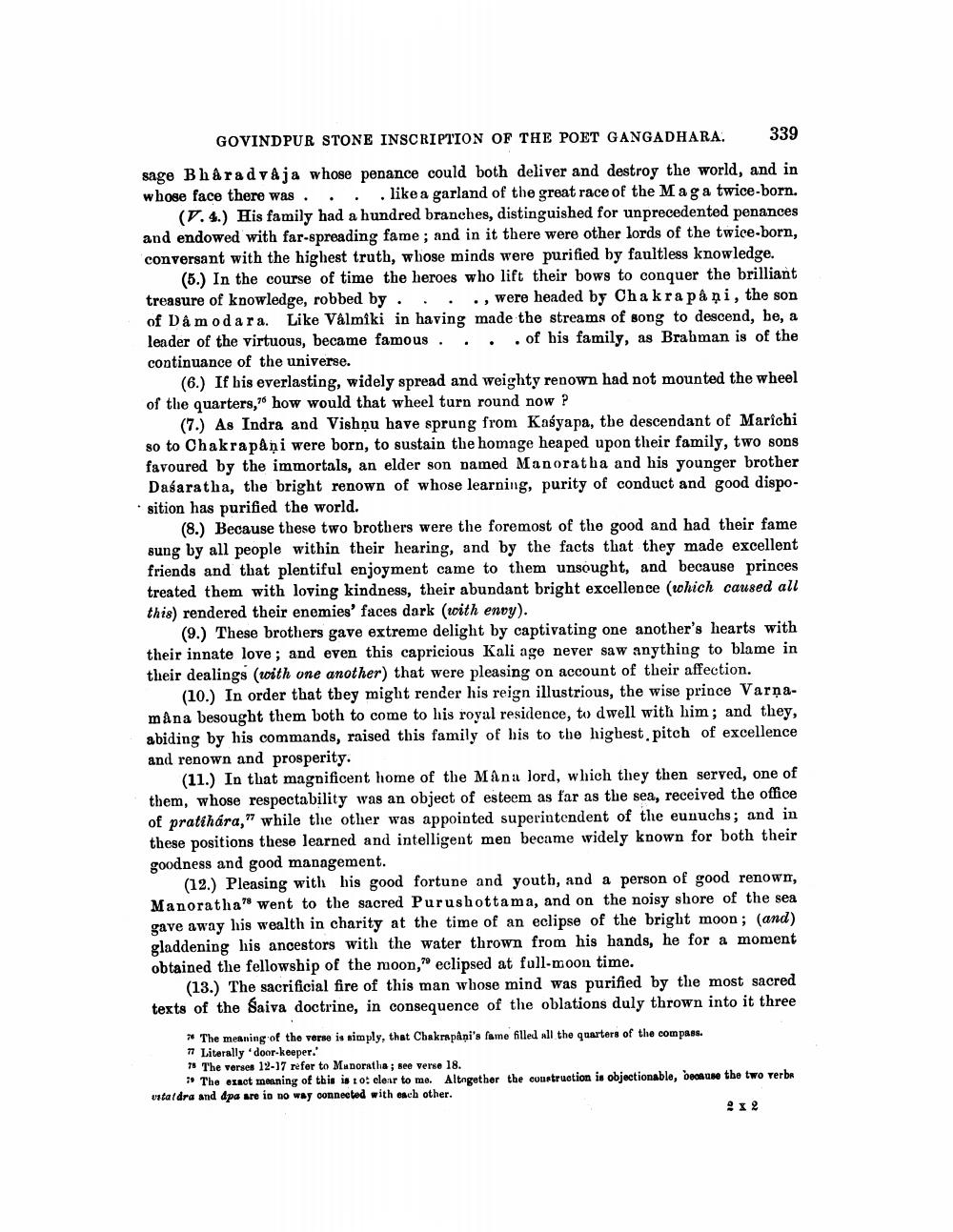________________
GOVINDPUR STONE INSCRIPTION OF THE POET GANGADHARA
339
sage Bharad vaja whose penance could both deliver and destroy the world, and in whose face there was . . . . like a garland of the great race of the Maga twice-born.
(V. 4.) His family had a hundred branches, distinguished for unprecedented penances and endowed with far-spreading fame; and in it there were other lords of the twice-born, conversant with the highest truth, whose minds were purified by faultless knowledge.
(5.) In the course of time the heroes who lift their bows to conquer the brilliant treasure of knowledge, robbed by . . . ., were headed by Chakra påņi, the son of Då modara. Like Valmiki in having made the streams of song to descend, be, a leader of the virtuous, became famous . . . . of his family, as Brahman is of the continuance of the universe.
(6.) If his everlasting, widely spread and weighty renown had not mounted the wheel of the quarters, how would that wheel turn round now?
(7.) As Indra and Vishnu have sprung from Kasyapa, the descendant of Marichi so to Chakrapani were born, to sustain the homage heaped upon their family, two sons favoured by the immortals, an elder son named Manoratha and his younger brother Dasaratha, the bright renown of whose learning, purity of conduct and good disposition has purified the world.
(8.) Because these two brothers were the foremost of the good and had their fame sung by all people within their hearing, and by the facts that they made excellent friends and that plentiful enjoyment came to them unsought, and because princes treated them with loving kindness, their abundant bright excellence (which caused all this) rendered their enemies' faces dark (with enoy).
(9.) These brothers gave extreme delight by captivating one another's hearts with their innate love; and even this capricious Kali age never saw anything to blame in their dealings with one another) that were pleasing on account of their affection.
(10.) In order that tbey might render his reign illustrious, the wise prince Varnamâna besought them both to come to his royal residence, to dwell with him; and they, abiding by his commands, raised this family of his to the highest pitch of excellence and renown and prosperity.
(11.) In that magnificent home of the Mâna lord, which they then served, one of them, whose respectability was an object of esteem as far as the sea, received the office of pratihára," while the other was appointed superintendent of the eunuchs; and in these positions these learned and intelligent men became widely known for both their goodness and good management.
(12.) Pleasing with his good fortune and youth, and a person of good renown, Manoratha" went to the sacred Purushottama, and on the noisy shore of the sea gave away his wealth in charity at the time of an eclipse of the bright moon; (and) gladdening his ancestors with the water thrown from his hands, he for a moment obtained the fellowship of the moon," eclipsed at full-moon time.
(13.) The sacrificial fire of this man whose mind was purified by the most sacred texts of the Saiva doctrine, in consequence of the oblations duly thrown into it three
* The meaning of the verse is simply, that Chakrapani's fame filled all the quarters of the compass. 77 Literally door-keeper.' 75 The verses 12-17 refer to Manoratha ; see verse 18.
** The exact meaning of this is to clear to me. Altngether the construction is objectionable, on the two verba ustaldra and dpa are in no way connected with each other.




